Puss Pettus was a 19th-century American prostitute. She was a successful business owner in Tennessee, best known for running a brothel in Memphis during the American Civil War.
Puss Pettus was a 19th-century American prostitute. She was a successful business owner in Tennessee, best known for running a brothel in Memphis during the American Civil War.
Pettus originally worked in Nashville in the Middle Tennessee region of the state, as she was arrested there circa 1855, during regular vice sweeps. The routine was that brothel keepers were arrested at "approximately monthly intervals, fined...according to the number of prostitutes they housed, and then released...This loose system effectively taxed madams according to how many operatives they claimed." [1]
Pettus later relocated to Memphis in West Tennessee. Perhaps one reason that Pettus was often described as "notorious" is that when Memphis brothels were policed, "in the main the keepers of brothels, not the inmates, faced charges of prostitution...Only in rare cases were the brothel operatives arrested." Pettus was arrested many times for operating what the newspapers usually called a bagnio or house of ill repute. [2] Her place was located downtown, near the steamboat landing, close to the slave market and the major hotels. She was down the street from the Gayoso Hotel —specifically, "left down Gayoso Avenue and passing near to where a bridge crossed the bayou Gayoso, stood the brothels of Emma Piquet (or Pickett) and Puss Pettus." [3] In November 1860, Pettus was charged with forging a slave pass, "an offense punishable by time in the penitentiary. Although found not guilty, the charge offers a tantalizing suggestion of cooperation between enslaved people and sex workers". [4]
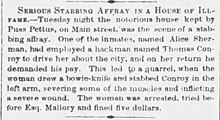
Days after secessionist Memphis was recaptured by Union troops on June 6, 1862, Nathan Bedford Forrest's Confederate-aligned brother John N. Forrest shot a U.S. Navy master's mate named Theodore Gilmore in a parlor at Pettus' brothel. [5] According to a history of American Civil War-era prostitution, "Less than two weeks after Union troops entered Memphis...Provost Marshal John H. Gould found it necessary to issue a special order stating, 'Lewd women are prohibited from conversing with soldiers while on duty; nor will they be allowed to walk the streets after sunset. Anyone of the class indicated who shall violate this order will be conveyed across the river and will not be allowed to return within the limits of the city.' The same day that newspapers published the order, military police escorted the infamous Puss Pettus across the river." [6] [7] A sense of the general character of Pettus and her work friends is conveyed by a July 1862 newspaper description of the "fast women of Memphis...The Cyprians are often young and comely, and are expensively dressed, though frequently with sober and excellent taste. They are too broad to be bound by political creed or formulas. They are universal." [8]
One of the sex workers in Pettus' employ was named Louisa Fisher; Pettus accused Fisher of theft after Fisher after she said something to the effect of being "$350 ahead of the old cow". [9] Pettus and Fisher's occupations were an open secret but during the court proceedings Pettus fell back on the euphemistic job description "boarding house keeper". [10]
Pettus may have had as many as 11 children. [11]

Nevada is the only U.S. state where prostitution is legally permitted in some form. Prostitution is legal in 10 of Nevada's 17 counties, although only six allow it in every municipality. Six counties have at least one active brothel, which mainly operate in isolated, rural areas. The state's most populated counties, Clark and Washoe, are among those that do not permit prostitution. It is also illegal in Nevada's capital, Carson City, an independent city.

A brothel, bordello, bawdy house, ranch, house of ill repute, house of ill fame, or whorehouse is a place where people engage in sexual activity with prostitutes. However, for legal or cultural reasons, establishments often describe themselves as massage parlors, bars, strip clubs, body rub parlours, studios, or by some other description. Sex work in a brothel is considered safer than street prostitution.
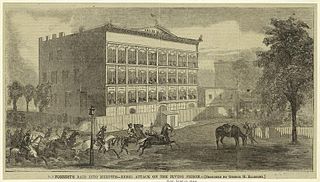
The Second Battle of Memphis was a battle of the American Civil War occurring on August 21, 1864, in Shelby County, Tennessee.

Baltimore's The Block is a stretch on the 400 block of East Baltimore Street in Baltimore, Maryland, containing several strip clubs, sex shops, and other adult entertainment merchants. During the 19th century, Baltimore was filled with brothels, and in the first half of the 20th century, it was famous for its burlesque houses. It was a noted starting point and stop-over for many noted burlesque dancers, including the likes of Blaze Starr.

The Levee District was the red-light district of Chicago from the 1880s until 1912, when police raids shut it down. The district, like many frontier town red-light districts, got its name from its proximity to wharves in the city. The Levee district encompassed four blocks in Chicago's South Loop area, initially between Harrison and Polk, between Clark and Dearborn, and then the newer Levee district, between 18th and 22nd streets. It was home to many brothels, saloons, dance halls, and the famed Everleigh Club. Prostitution boomed in the Levee District, and it was not until the Chicago Vice Commission submitted a report on the city's vice districts that it was shut down.

In Great Britain, the act of engaging in sex or exchanging various sexual services for money is legal, but a number of related activities, including soliciting in a public place, kerb crawling, owning or managing a brothel, and pimping, are illegal. In Northern Ireland, which previously had similar laws, paying for sex became illegal from 1 June 2015.

Julia Brown was an American madam and prostitute active in mid-nineteenth century New York City. Brown has been described as "the best-known prostitute in antebellum America". Brown was known for playing the piano in her brothel and for being a guest at functions hosted by the best families in New York. She also had season ticket to two theaters, paid for pews in various churches and contributed generously to local bible societies. She became a popular subject of tourist guidebooks, and her name appears often in diaries from the period.
Adeline Miller, alias Adeline Furman, was an American madam and prostitute. According to her contemporary George Templeton Strong, Miller was active in New York City prostitution from the late 1810s. By 1821, she was running a brothel on Church Street, where she had accumulated personal effects worth at least $500.

Prostitution is illegal in the vast majority of the United States as a result of state laws rather than federal laws. It is, however, legal in some rural counties within the state of Nevada. Additionally, it is decriminalized to sell sex in the state of Maine, but illegal to buy sex. Prostitution nevertheless occurs elsewhere in the country.
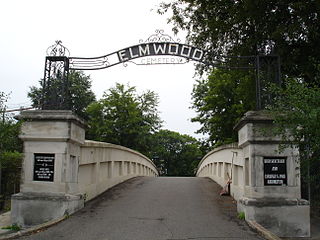
Elmwood Cemetery is the oldest active cemetery in Memphis, Tennessee. It was established in 1852 as one of the first rural cemeteries in the South.
Prostitution in Ireland is legal. However, since March 2017, it has been an offence to buy sex. All forms of third party involvement are illegal but are commonly practiced. Since the law that criminalises clients came into being, with the purpose of reducing the demand for prostitution, the number of prosecutions for the purchase of sex increased from 10 in 2018 to 92 in 2020. In a report from UCD's Sexual Exploitation Research Programme the development is called ”a promising start in interrupting the demand for prostitution.” Most prostitution in Ireland occurs indoors. Street prostitution has declined considerably in the 21st century, with the vast majority of prostitution now advertised on the internet.

Procuring, pimping, or pandering is the facilitation or provision of a prostitute or other sex worker in the arrangement of a sex act with a customer. A procurer, colloquially called a pimp or a madam or a brothel keeper, is an agent for prostitutes who collects part of their earnings. The procurer may receive this money in return for advertising services, physical protection, or for providing and possibly monopolizing a location where the prostitute may solicit clients. Like prostitution, the legality of certain actions of a madam or a pimp vary from one region to the next.
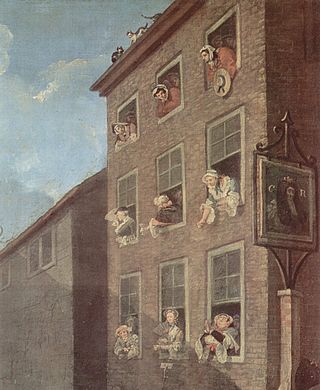
Jane Douglas, commonly known as Mother Douglas, was a brothel-keeper in mid-18th century London. Known at the time as "The Empress of the Bawds", her house in Covent Garden attracted customers from the higher echelons of society.
Prostitution is the business or practice of engaging in sexual activity in exchange for payment. The definition of "sexual activity" varies, and is often defined as an activity requiring physical contact with the customer. The requirement of physical contact also creates the risk of transferring infections. Prostitution is sometimes described as sexual services, commercial sex or, colloquially, hooking. It is sometimes referred to euphemistically as "the world's oldest profession" in the English-speaking world. A person who works in the field is usually called a prostitute or sex worker, but other words, such as hooker and whore, are sometimes used pejoratively to refer to those who work as prostitutes.
Damaris Page also known as Damarose Page, was a London brothel keeper, entrepreneur and property developer, one of the most successful and famous prostitutes of her time.

Elizabeth Cresswell, also known as Mother Creswell and Madam Cresswell of Clerkenwell, was one of the most successful prostitutes and brothel keepers of the English seventeenth century. Starting with houses in Bartholomew Close, in the City of London and St Leonard's, Shoreditch, she built a widespread network of brothels across London, supplied with girls and women from across England. Her employees included the wives of soldiers pressed into service for Charles II and gentlewomen who had supported the Cavalier cause during the English Civil War and had since fallen on hard times. Her bawdy houses were favoured by King Charles and his court as well as powerful figures in government and city guilds. This position gave her a measure of immunity from prosecution and added to her profile as a caricature of iniquity and corruption.

Madame Therese, also known as Madame Traese, was the professional name of a famous Dutch brothel keeper. She operated one of the largest and most famous brothels of her time in Amsterdam, with a reputed international list of powerful clients, and was often caricatured in the press. She is confirmed as active from 1706 until 1729.
Els von Eystett was a woman who worked in a public brothel in Nördlingen, Germany, in the late fifteenth century. Els originally worked in the brothel as a kitchen maid and later as a prostitute. Her experiences are documented in the records of a criminal investigation carried out by the city council of Nördlingen between December 1471 and January 1472.
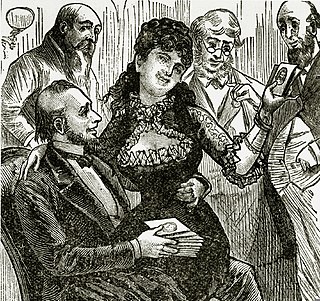
Eliza Haycraft (1820-1871), was a wealthy brothel madam and philanthropist, who donated money to the widows and orphans of the American Civil War.
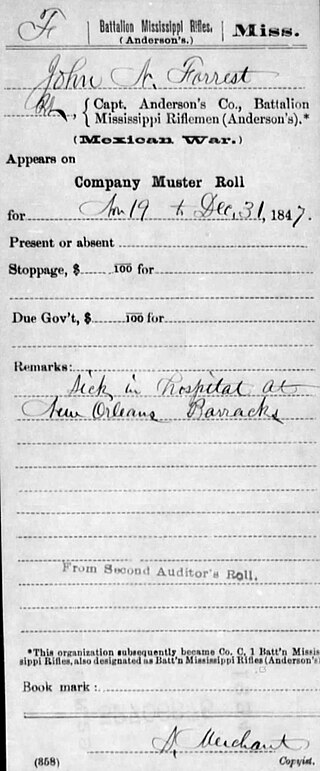
John N. Forrest was one of the six Forrest brothers who engaged in the interregional slave trade in the United States prior to the American Civil War. A disabled veteran of the Mexican–American War, he worked in family businesses, including as the jailor at Nathan Bedford Forrest's slave pen in downtown Memphis.
PARKER, unnamed - male - b: May 9, 1884, Springfield Twp - 11th child of Puss PETTUS - age: 39 - bca: 1845, MO - fth: Nathan E. - age: 46 - bca: 1838, KY - occ: farmer - att: James H. Baugh, Leesville - bk: 1, pg 49